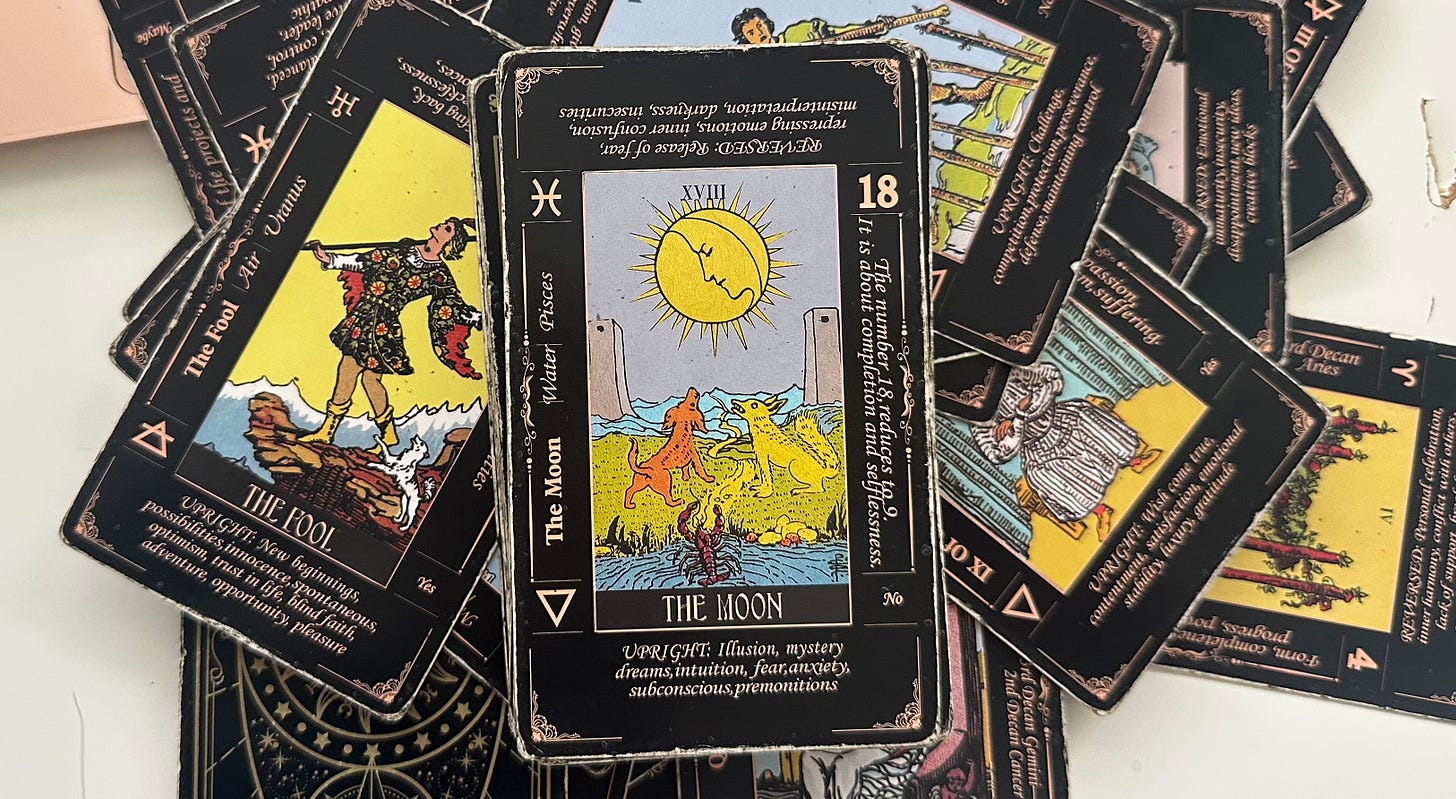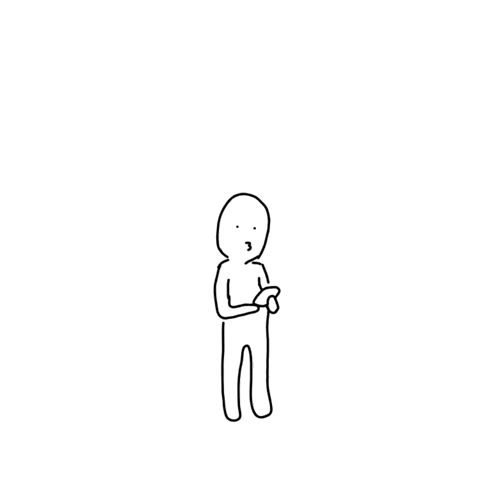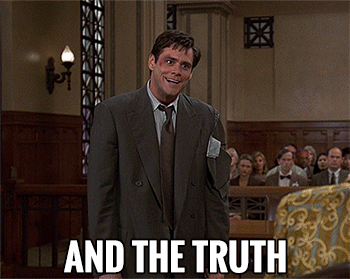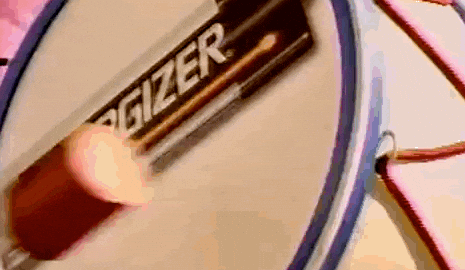Sacred Sunday: Navigating Neurodivergent Love
On balancing structure, softness, and self-acceptance in a neurodiverse relationship.
I originally wrote these thoughts in my journal, but then realized these thoughts needed to live here instead. Lately, I haven’t been able to get myself to write much outside of tarot, but this one felt too important to keep private. Maybe someone will see a reflection of themselves in my words, or maybe someone will read and be able to understand their neurodivergent partner a bit more💛
I’m currently in that sweet, sparkly honeymoon phase of my relationship. I told my boyfriend early on that month three is where I usually start to see the cracks—the real layers of a person and the true foundation being built beneath all the rainbows and butterflies.
And right on cue, here I am in month two; intrusive thoughts already trickling in like an early winter storm. Only this time, the cracks I’m catching are coming from within me.
It started with something small: I told him my energy was low the other day and joked about how the high for the day was only 69° (we see that number a lot because he’s a life path 6 and I’m a 9).
For me, the day’s temperature was a sign that hibernation season was on its way. That’s what I call it when the air turns colder, the days grow shorter and duller, and my seasonal depression starts tapping on my shoulder like, “Hey girl, remember me?”
We’re mammals after all—I once read that humans are naturally meant to slow down in the winter, just like most other animals. But for those of us with seasonal depression, it’s more than slower energy. It’s mental and emotional molasses.
That realization alone sparked a shift in me.
Suddenly, I remembered all the “quirks” this man has yet to witness—the routines, the stims, and coping mechanisms; the oddly specific habits that actually keep me grounded. I tend to joke about it all because I think it’s still hard to accept it all myself, but when I don’t take them seriously, things can spiral fast—mentally, physically, and emotionally.
It hasn’t been easy explaining the past nine years of my life: the depression, the hospital admissions, my attempt story, and all the times I’ve pivoted so sharply that I’ve seemed manic and lost to everyone around me. It’s embarrassing, and it carries layers of guilt and shame. I talk about it like it’s behind me, but the truth is…I’m still haunted, just in softer ways now.
I’ve only recently learned how to manage it all with more consistency, with help. And now, I’m inviting someone new into that system of support—which feels both beautiful and terrifying. Because letting him in means allowing him to see me at my worst. And that’s always been the part where people leave.
I’ve never felt so secure in myself and yet so eerily naked and vulnerable. No one has ever had access to this version of me. So this really is a case of choosing faith over fear, and allowing myself to be proven wrong.
To be shown that the person I used to hide is worthy of being loved out loud.
I told him, “…this is probably why I didn’t try to date for a while,” not realizing I was really avoiding the vulnerability that comes with opening myself fully to someone.
I wasn’t just afraid of being a burden, but of the rejection that would/might follow. Deep down, I know everyone comes with “a lot.” The right people don’t see me as a burden—they see me as human. True love grows and strengthens through the struggles.
Still, it’s easy for me to overthink. When I start dating someone new, I tend to lose myself a little in their world—my desires, my needs, my routines, my rhythms. So I went from being too deep in my feminine energy, and letting my relationships completely drain me, to the masculine, hyper-independent energy I’m working to balance now.
Generally, the challenge comes down to wanting to show up as much as possible for my partner while also doing the same for myself. I’ve just never thought about it all so intentionally before, and it’s brought a new layer of perspective, but also discomfort. I feel shame sometimes for thinking so deeply about what I need, worrying I might come across as selfish, asking for too much.
My thinking tends to be very black and white, and past relationships have only reflected to me either extreme—I’d either completely lose myself in my partner’s world or I would become rigid in my rules and expectations, confusing them with the boundaries and standards I actually needed to focus on building.
After the initial rush of the first two weeks of love dopamine, my brain starts asking more practical, yet anxious questions: Is this sustainable for me? Am I compromising too much too soon? Can our lifestyles and personalities merge and satisfy us both? What’s going to be the issue??? WHAT’S THE OTHER SHOE???
Cracks or Compromise?
For example, he loves phone calls and FaceTime; I struggle with both. Mainly because of my focus and attention span, but also because of nerves. Add long distance into the mix, and suddenly I put pressure on myself to be “on” and accessible even when my mind and body need quiet. I make sure to compromise when I can, but forcing it only leads me to overstimulation, irritability, and migraines. Some nights, I just have to put my phone down and talk tomorrow. Balance isn’t optional for me—it’s essential.
Then there’s the long-distance question itself. He’s in Michigan, with his career and even a house already picked out. I’m in the South, with my own roots and routines. Visiting him was incredible, but it also reminded me of past relationships where my needs were overlooked. So I have to ask myself: am I walking into a shared dream, or just trying to fit into his?
How would I handle a Michigan winter with seasonal depression? Would I be okay without my community nearby? I’m a Florida-and-California dreamer at heart; the beach and warm air are where I feel best. But now that the person I love lives farther from that tropical fantasy, I embrace winter storms as a necessary compromise.
My man is patient, thoughtful, and deeply considerate—never the kind of person who’d ever let me forget myself or live an unsatisfying life. With him, I feel safe, secure, and deeply loved and supported. I’m learning how to trust that I can rest in love and know that I’ll be carried, even when I can’t carry myself. My fears don’t have to hold me hostage anymore, because I know we’ll handle whatever comes together as a unit. A team
Understanding Myself as AuDHD
Now that we’ve gotten through my overthinking, let’s talk about what I’ve actually noticed. The shifts, the patterns. Specifically, about how I show up when I’m being my most authentic self. Because loving someone as a neurodivergent woman—someone who’s not quite wired the same—has been its own kind of mirror.
It’s taught me a lot about how my brain works, how my needs show up in different areas, and what it really means to let myself be seen without performing. That’s been the biggest adjustment… and the most freeing one.
I’m most likely AuDHD, I just lack the financial resources for formal confirmation. But every therapist and doctor I’ve seen has always labeled me as “high-functioning,” whether for my depression, anxiety, or ADHD—but that label has always felt misleading and kind of…offensive? My ability to perform and function doesn’t equate to the ease I experience trying to manage and adjust to life.
For those unfamiliar, AuDHDers don’t always present as “typically autistic” or “typically ADHD.” Both disorders easily get confused as they can present similarly, but individually can also manifest in a multitude of ways that can be conflicting, depending on the person. We live in this in-between space that often goes misunderstood, unnoticed, and undiagnosed.
Here are some common traits of AuDHDers, shared by the Autistic Girls Network:
Frequently creating or changing routines to manage anxiety around change, while also craving novelty
Impulsively choosing change, then experiencing anxiety due to the change.
May feel anxious every day about running late or not being early.
Exceptionally long-term memory but poor working/short-term memory, or vice-versa.
Their intense/special interests may regularly change theme or topic.
The more I allow my authentic self to shine—quirks, stims, routines, and all—the more I realize how I’ve subconsciously attempted to be perceived as neurotypical for most of my life. And now, in the first relationship where I’m not masking nearly as much, I’m learning what it feels like to truly be seen. And it’s terrifying.
Being perceived in full means risking triggering my rejection sensitivity even more, trusting that I won’t be shamed or abandoned for things I’ve felt were “too much.” So it’s been interesting to see how we navigate when our differences do begin to appear.
For example…
Food and Emotional Regulation
Here’s a real one: eating.
I’m extremely picky. I cook well, but tend to rotate the same few comfort meals. Sometimes, if I can’t eat what I want, I get physically uncomfortable and sometimes sick. It’s like a “childlike tantrum” creeps in.
For a long time, I thought I was just being dramatic. I try to force myself to be better. But it’s not drama—it’s neurology.
Neurodivergent people often struggle with food due to sensory sensitivities, executive dysfunction, and disrupted interoception (difficulty recognizing hunger or fullness). We might forget to eat, hyperfocus too long, or lose our appetite when stressed. By the time we realize we’re hungry, we’re “hangry” in the truest sense—irritable, overwhelmed, and on the verge of tears. Sometimes I’ll even start burping and eventually become sick.
Now I’m learning to remind myself: I’m not being difficult, I’m dysregulated.
Recently, my boyfriend got to witness that side of me. He felt like a bad host, but I felt bad for not thinking to prepare him for how specific my food needs can be. I don’t like to come off as needy, moody, or sensitive, but that moment showed me I can’t wait for our appetites to sync up; for both of our benefit, my body deserves care on its own rhythm.
He’s a vegetarian who usually eats later than I do. He can snack throughout the day and survive off fruit, while I’m an omnivore who eats early, rarely snacks, and needs a main course and two sides to feel full. Our eating styles couldn’t be more different.
But instead of seeing it as incompatibility, I see it as a guide: this is what my body needs, and that’s what his does. Both are valid, and it’s not impossible to work around. His habits only influence my diet more positively and support my neurological needs; while I’ve taught him to ease up, and not be afraid to eat a bag of chips if that’s what he wants lol.
For those who relate, here’s what helps me:
Consistency over perfection. Eat regularly. Don’t skip meals chasing a “perfect” diet. Use reminders or visual timers to prompt eating.
Honor your safe foods. Having safe foods readily available reduces mealtime anxiety and provides comfort. Eating the same meals isn’t wrong if they help to regulate you. Explore and try to expand your palette if you can, but don’t shame yourself for sticking to what works for you.
Simplify meals. Keep quick, easy options like protein bars, frozen meals, or pre-cut fruits and vegetables on hand. This helps when cooking feels overwhelming.
Reframe the narrative. It’s not pickiness—it’s sensory. Your emotional response is valid. Remind yourself that it is not a character flaw, just a neurological difference.
Sleep and Routine
Then there’s sleep, my old frenemy.
I’ve always loved naps, but as an adult with ADHD, I’ve learned sleep isn’t just rest—it’s regulation. When my sleep schedule slips, everything else follows.
My boyfriend is a night owl. I’m not. If I try to match his rhythm, my focus tanks, my mood dips, and I… unravel. I’ve learned to hold boundaries around bedtime, even when I want to stay up giggling with him until 5 am.
My intended routine sometimes feels boring, but it keeps me stable:
No caffeine after noon (if I can help it)
Skincare after dinner
Phone on Do Not Disturb by 9 pm—time for TV, journaling, reading, or guilt-free doomscrolling time
Lights off by 10 pm—meditation until 10:30 or 11
Weighted blanket, eye mask, alarm set for 8 am
When done consistently, it’s incredibly grounding and rejuvenating for me…
Sacred.
Still, I often struggle to fall or stay asleep. I wake groggy, rely on medication for motivation, and sometimes crash into naps that last way too long. By nightfall, my brain gets its second wind—racing thoughts, bursts of energy, insomnia.
It’s a cycle I’m still learning to regulate with gentleness, not judgment. Because structure, especially with an AuDHD brain, isn’t about perfection—it’s about honoring your patterns while giving yourself grace to rest.
As someone whose income depends on the content I create and the clients who find me through it, I don’t have the luxury of waiting for motivation to strike. Like any job, discipline has to come before inspiration. If my routines waver, it doesn’t just impact my mood—it affects my energy, productivity, and ultimately, my money.
I’ve been scared my future would look like me depending on someone for my stability, but it’s not about losing my independence. It’s about finding someone who brings balance, who uplifts me, inspires me, and whose energy feels like the Yang to my Yin. Having him in my life makes everything feel possible.
Even though we’ve only recently met, I recognize his soul, his warmth, and the way our energies intertwine effortlessly. Our love feels like ease, like an exhale. The way he looks at me is not with lust, but with devotion, and it makes me want to see and love myself the way he already does. I love that. I love him. I love love.
Thank you so much for reading The Divine Vitality!
If my stories, readings, and reflections bring value to your journey, inspire, or guide you, I would be truly grateful if you’d consider supporting me. You can become a paid subscriber, book an affordable tarot reading to help me practice and grow, or even offer a small contribution via my tip jar.
My heart for this blog has always been to share love, light, and healing openly, and I deeply desire that everyone who visits here finds something meaningful. At the same time, your support empowers me to keep creating, sharing, and learning as I pursue this as my career. Every bit of encouragement and support is a blessing, and I’m endlessly grateful to each of you for helping make this journey possible.
Thank you for being here💛







Beautiful post, Jordan. We are peeling back necessary layers, becoming more self aware as we move forward. I Love Love, I Love You ❤️🔥
🙌🏾🙌🏾💛💛